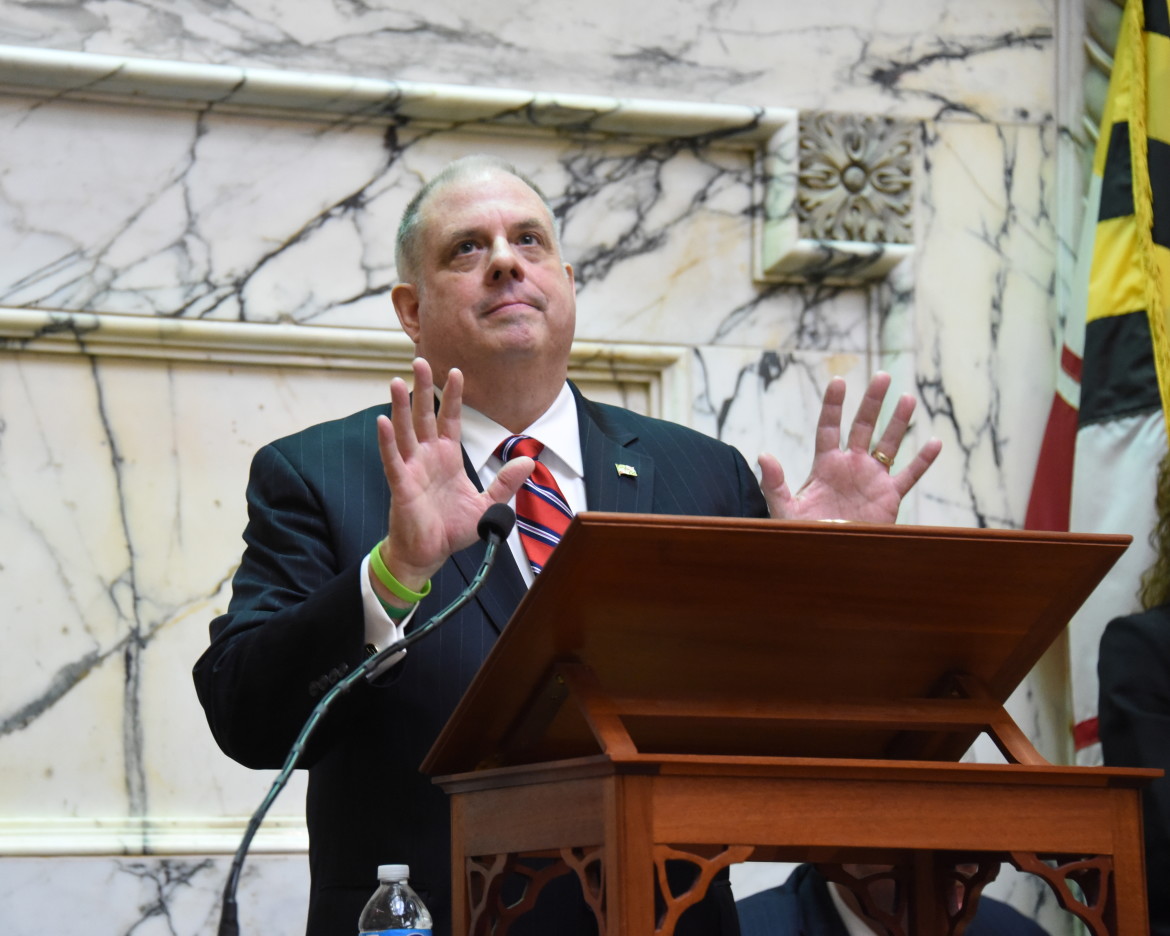Hogan strong arms his own state school board
By Barry Rascovar
For MarylandReporter.com
In one of the oddest situations Annapolis has seen in recent times, Gov. Larry Hogan is trying to sabotage his own school board.
That’s right. A state school board made up almost exclusively of Hogan appointees is scheduled today to submit to federal officials a plan for turning around under-performing schools.
The panel agreed to this improvement plan after 19 months of intense study that included five “listening tours,” 205 meetings, testimony from education experts and extensive staff research.
Yet the governor is intent on blowing up his school board’s plan before it arrives in Washington.
Hogan wrote a scathing letter to Education Secretary Betsy DeVos denouncing the school-improvement program approved by his own education panel. He says it preserves “the status quo in failing schools.”
A reading of the state’s submittal doesn’t appear to support Hogan’s objection, which is rooted almost completely in politics, not education.
Hogan wants to turn under-performing schools over to private contractors to be run as charter, non-unionized schools. He’d like to strip counties and Baltimore City of authority over those schools and lump them into “recovery districts” controlled by the state. He’d love to shut down failing schools and give students vouchers to attend private schools.
Multiple-choice education
His notions are rigidly conservative and radical. He would sweep away much of the underpinnings of Maryland’s public school system, including local control. Hogan wants to replace weak-performing schools with a privatized, multiple-choice system for educating children.
That idea hasn’t gotten off the ground in the Maryland General Assembly. The Democratic-controlled legislature repeatedly has rejected Republican Hogan’s attempts to privatize parts of the state’s public education system.
To make sure Hogan can’t embed his conservative education ideas by way of state school board decisions, the legislature passed a measure earlier this year limiting reforms the state panel can include in a plan it must submit to Washington to deal with failing schools.
Essentially, Democratic lawmakers instructed the state board that reform efforts must deal directly with student deficiencies and teacher deficiencies at existing schools. The board’s remediation plan must be implemented within the current education structure. No radical steps like charter schools, privatized management, vouchers or recovery districts allowed.
Lawmakers also rankled Hogan by limiting how much weight can be given to standardized tests in determining if a school is failing.
Hogan vetoed the legislature’s bill, which Democrats then easily voted to override.
Much of the language approved by the legislature is what the powerful state teachers union wanted to protect its members from being fired in a mass privatization movement.
Dealing with failed schools
Yet the legislature’s restrictions hardly amount to “preserving the status quo.” It did restrain what Hogan’s school board can propose as far as school takeovers and other sweeping moves to turn to private-sector solutions.
Yet the final product gives a detailed description of how schools will be judged and how the state will support comprehensive improvements in the weakest public schools.
It’s a far more challenging and thoughtful plan than an “off-with-their heads” approach that would re-create faltering public schools along privatized lines.
Hogan could well gain backing for his subversion from DeVos in Washington. After all, the pair made a joint guest appearance at an elementary school in Montgomery County earlier this year. Their education ideas seem to mesh.
She, too, is an ardent believer in privatization of schooling, though that approach has a mixed record.
Despite reservations from some of its members, the state education board’s submission to Washington is a solid, commendable effort to directly confront failings in schools across Maryland. The stress is on comprehensive efforts to improve teaching skills and student performance.
That may not be radical enough for Hogan, who is using all his tools to try to gum up the works. The danger is that he succeeds, with $250 million in federal school aid hanging in the balance.
But don’t count on Democrats in the legislature letting the Republican governor have his way on education privatization, even if DeVos sides with him. They are unlikely to yield.
This could well turn into an election issue next year with Hogan appealing to his conservative political base, accusing Democrats of pandering to the teachers’ union and resisting wholesale reforms.
On the other side, Democrats are sure to exploit Hogan’s unyielding advocacy of school privatization as part of his effort to diminish state support of public education.
DeVos’ decision on Maryland’s school-improvement proposal could play a prominent role in the state’s upcoming elections, especially the race for governor. It could have ramifications far beyond the classroom.
Barry Rascovar’s blog is www.politicalmaryland.com. He can be reached at [email protected].

MarylandReporter.com is a daily news website produced by journalists committed to making state government as open, transparent, accountable and responsive as possible – in deed, not just in promise. We believe the people who pay for this government are entitled to have their money spent in an efficient and effective way, and that they are entitled to keep as much of their hard-earned dollars as they possibly can.

